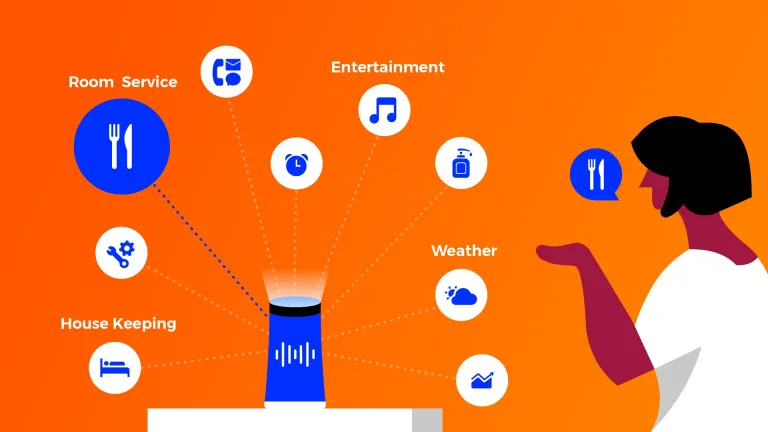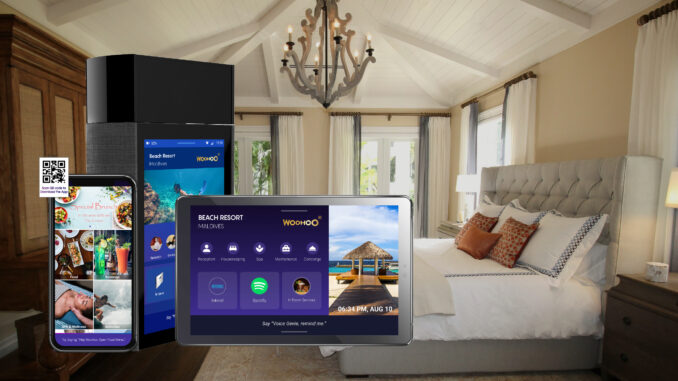Transforming Hospitality with Voice AI Technology
In today's digital-first hospitality landscape, providing contactless yet personalized experiences has evolved from a luxury to a necessity. Voice AI technology stands at the forefront of this transformation, offering hotels a powerful way to enhance guest satisfaction while streamlining operations.
This comprehensive guide explores how implementing Voice AI creates seamless, touchless interactions throughout the guest journey—from pre-arrival to post-checkout—while delivering substantial operational benefits and ROI for hotel properties of all sizes.
What You'll Discover in This Guide:
- Real-world voice command scenarios that enhance the guest experience
- Practical implementation strategies for different hotel types and budgets
- ROI analysis with concrete metrics from actual deployments
- Step-by-step deployment roadmap for successful integration
- Future-ready insights to keep your property ahead of the curve
Understanding Voice AI in Hospitality
Voice AI technology combines natural language processing (NLP), machine learning, and voice recognition to create intelligent systems that understand, interpret, and respond to human speech. In hospitality settings, this technology creates a touchless interface between guests and hotel services.
How Voice AI Works in Hotels
Modern voice assistants deploy sophisticated algorithms that:
- Capture spoken commands through strategically placed microphones
- Convert speech to text using advanced recognition technology
- Interpret intent through natural language understanding
- Execute appropriate actions via integrated systems
- Respond naturally using text-to-speech technology
- Learn and improve from each interaction

Voice AI vs. Traditional Guest Interfaces
| Aspect | Traditional Methods | Voice AI Technology |
|---|---|---|
| Accessibility | Requires physical interaction or device proficiency | Universal access through natural speech |
| Response Time | Minutes to hours, depending on staff availability | Instantaneous responses 24/7 |
| Personalization | Staff-dependent, variable consistency | Data-driven, consistently personalized |
| Contact Points | Multiple physical touchpoints | Contactless, hygienic interaction |
| Operational Hours | Limited by staff schedules | Always available, no time constraints |
| Scalability | Requires additional staffing | Infinitely scalable with minimal incremental cost |
Key Benefits of Voice AI in Hotel Environments
Enhanced Health & Safety
Minimizes physical contact with surfaces, reducing transmission risks and addressing heightened guest health concerns.
Immediate Response Time
Provides instant service fulfillment without wait times, significantly improving guest satisfaction metrics.
Staff Optimization
Automates routine requests, freeing staff to focus on high-value guest interactions that require human touch.
Multilingual Support
Offers seamless service in multiple languages, eliminating communication barriers for international guests.
Revenue Enhancement
Increases in-room dining and service utilization through frictionless ordering and personalized recommendations.
Data-Driven Insights
Gathers valuable guest preference data to inform operational improvements and marketing strategies.
"Voice AI technology has fundamentally changed how we deliver service. Our staff now spends 32% less time on routine requests while our guest satisfaction scores have increased by 18%."
— Michael Chen, Director of Operations, Horizon Luxury Hotels
Interactive Voice Command Scenarios
Voice AI creates intuitive, natural interactions throughout the guest journey. Here are real-world scenarios showing how this technology transforms the guest experience:
Room Environment Control
Behind the scenes: The system integrates with the hotel's building management system to control HVAC, lighting, and window treatments, while learning guest preferences for future stays.
In-Room Dining Assistance
Behind the scenes: The system connects to the hotel's POS and room service management system, placing the order, tracking preparation time, and adding the charge to the guest's folio, while also noting preferences for future personalization.
Local Information and Recommendations
Behind the scenes: The system cross-references local business data, reviews, and availability while integrating with reservation platforms to provide accurate, real-time information and concierge-level service.
Voice AI Application Points Throughout the Guest Journey
Pre-Arrival & Check-In
- Virtual pre-arrival concierge
- Contactless check-in assistance
- Room preference confirmation
- Special request management
In-Room Experience
- Environmental controls (HVAC, lighting)
- Entertainment system operation
- In-room dining services
- Housekeeping requests
During Stay
- Local recommendations and navigation
- Hotel amenity information and booking
- Service request management
- Billing inquiries and updates
Check-Out & Post-Stay
- Express check-out processing
- Transportation arrangements
- Feedback collection
- Future booking facilitation
Strategic Implementation Guide
Successfully deploying Voice AI in a hotel environment requires careful planning and execution. Follow this proven implementation roadmap to ensure maximum ROI and guest satisfaction:
1. Assessment & Planning
- Infrastructure Evaluation: Assess existing network capability, hardware requirements, and system compatibility
- Use Case Prioritization: Identify high-impact voice interaction scenarios specific to your property
- Vendor Selection: Evaluate Voice AI providers based on hospitality industry experience, integration capabilities, and language support
- Privacy & Compliance: Develop clear protocols for data handling, consent, and regulatory compliance
PRO TIP: Begin with a comprehensive network assessment to ensure sufficient bandwidth and coverage for reliable voice recognition throughout the property.
2. Technology Selection & Integration
Key Integration Considerations:
| System Type | Integration Purpose | Complexity Level |
|---|---|---|
| Property Management System (PMS) | Guest profile access, room status, billing information | High |
| Point of Sale (POS) | Menu information, ordering, room charge processing | Medium |
| Building Management System | HVAC control, lighting, curtains, entertainment | Medium |
| Service Optimization Platform | Housekeeping requests, maintenance, staff dispatch | Medium |
| Concierge Systems | Local information, reservations, recommendations | Medium-Low |
PRO TIP: Select voice technology providers that offer pre-built hospitality integrations to significantly reduce implementation time and complexity.
3. Voice Experience Design
- Content Development: Create hotel-specific responses, prompts, and information
- Conversation Flow Mapping: Design natural dialogue pathways for different guest scenarios
- Multilingual Support: Configure language options based on guest demographics
- Voice Persona Creation: Design a voice personality that aligns with your brand
- Error Handling: Develop graceful recovery paths for misheard commands or unavailable services
Sample Conversation Flow Design:

PRO TIP: Develop a "voice brand guide" that defines your hotel's voice personality, vocabulary, and tone to ensure consistency across all voice interactions.
4. Deployment & Training
- Phased Rollout: Begin with limited functionality in select rooms before property-wide deployment
- Staff Training: Educate all team members on system capabilities, limitations, and troubleshooting
- Guest Education: Create intuitive in-room materials explaining voice commands and features
- Feedback Loops: Establish mechanisms to gather and incorporate user feedback
PRO TIP: Create a "voice command cheat sheet" for guests with the most useful commands categorized by service type (room controls, dining, concierge, etc.).
5. Optimization & Expansion
- Performance Monitoring: Track key metrics including usage rates, successful completions, and guest feedback
- Continuous Improvement: Regularly update voice content and capabilities based on data insights
- Feature Expansion: Gradually introduce more advanced capabilities as usage matures
- Integration Deepening: Extend connections to additional hotel systems over time
Voice AI System Evolution Timeline:
Phase 1: Foundation
Basic room controls and information
Months 1-3
Phase 2: Service Integration
Room service and housekeeping requests
Months 4-6
Phase 3: Personalization
Guest preference learning and recommendations
Months 7-9
Phase 4: Advanced Features
Predictive services and full integration
Months 10+
PRO TIP: Implement a continuous learning system where staff regularly reviews voice interaction logs to identify improvement opportunities and new use cases.
Real-World Implementation Success Stories
Luxury Boutique Hotel Chain: Voice-First Room Experience
Implementation Scope:
- Voice-activated in-room controls (lighting, temperature, window treatments)
- Service request management system integration
- Local information and recommendation engine
- Multi-language support for international clientele
Key Results:
- 22% increase in guest satisfaction scores related to room experience
- 31% reduction in routine service calls to front desk
- 18% increase in in-room dining revenue
- 43% of guests reported using voice features multiple times daily
"The voice system has become a signature element of our guest experience. It's remarkable how quickly guests adapt to using voice commands for everything from adjusting the room temperature to ordering breakfast."
— Sarah Lewis, Guest Experience Director

Implementation Timeline:
• Planning: 6 weeks
• Integration: 8 weeks
• Initial Rollout: 4 weeks
• Full Deployment: 3 months
Midscale Business Hotel: Voice-Powered Efficiency
Implementation Scope:
- Contactless check-in/check-out assistance
- Business service requests and information
- Room service and housekeeping integration
- Conference room scheduling and equipment control
Key Results:
- 26% reduction in front desk staffing requirements
- 44% decrease in check-in processing time
- 19% improvement in housekeeping response time
- 16% increase in guest satisfaction among business travelers
"For our business-focused property, efficiency is everything. Voice AI has allowed us to deliver faster service with fewer resources while actually improving the guest experience."
— Robert Martinez, General Manager

ROI Highlights:
• Initial Investment: $185,000
• Annual Savings: $143,000
• Payback Period: 15 months
• 5-Year ROI: 287%
ROI Analysis: Voice AI Investment Returns
Investments in Voice AI technology deliver both quantifiable financial returns and qualitative benefits that enhance the overall guest experience and brand value.
Direct Financial Benefits
| Benefit Category | Typical Impact |
|---|---|
| Labor Cost Reduction | 15-25% |
| In-Room Dining Revenue | +12-18% |
| Energy Efficiency | 8-15% |
| Operational Efficiency | 20-30% |
| Upsell Conversion Rate | +15-22% |
Investment Range by Property Size:
- Small (up to 50 rooms): $50,000 - $100,000
- Medium (51-200 rooms): $100,000 - $250,000
- Large (201+ rooms): $250,000 - $500,000+
*Costs vary based on scope, existing infrastructure, and integration complexity
Qualitative Benefits
-
Enhanced Brand Perception
Innovation positioning that attracts tech-savvy guests and builds brand equity
-
Competitive Differentiation
Creates a memorable stay experience that stands out in a crowded market
-
Data-Driven Insights
Rich guest preference data that informs future service and amenity decisions
-
Staff Engagement
Improved employee satisfaction by eliminating routine tasks and enhancing guest interactions
-
Accessibility Improvements
Better service access for guests with limited mobility or visual impairments
Typical ROI Timeline:

ROI Maximization Strategies
Implementation Approach
- Begin with high-impact, low-complexity use cases
- Deploy in premium rooms first for higher revenue impact
- Implement with existing hardware where possible
- Create a phased rollout plan aligned with budget cycles
Ongoing Optimization
- Regularly review usage analytics to identify expansion opportunities
- Update voice content based on guest interaction patterns
- Track service efficiency improvements for accurate ROI measurement
- Continuously train staff on maximizing system capabilities
Best Practices & Common Pitfalls
Best Practices
-
Start with a limited command set
Begin with a core set of 10-15 high-value commands rather than overwhelming guests with too many options.
-
Provide clear documentation
Create elegant in-room materials that highlight available voice commands and capabilities.
-
Test extensively with diverse accents
Ensure the system can understand various accents and speech patterns before full deployment.
-
Maintain human backup options
Always provide alternative methods for guests who prefer traditional service channels.
-
Establish clear privacy protocols
Transparent data policies that respect guest privacy while enabling personalization.
-
Create a voice brand personality
Develop a consistent voice character that aligns with your hotel's brand values.
Common Pitfalls
-
Inadequate network infrastructure
Failing to ensure sufficient Wi-Fi coverage and bandwidth for reliable voice recognition.
-
Poor integration with existing systems
Implementing voice technology as a standalone solution rather than integrating with PMS, POS, and other systems.
-
Insufficient staff training
Failing to properly educate staff on system capabilities, limitations, and troubleshooting.
-
Overlooking linguistic diversity
Not accommodating the languages spoken by your guest demographic.
-
Attempting too much too soon
Implementing complex voice experiences before mastering the basics.
-
Ignoring acoustic environment
Not accounting for room acoustics that may impact voice recognition accuracy.
"The hotels that succeed with voice technology are those that view it not as a novelty but as an integral part of their service strategy. They start small, learn quickly, and expand thoughtfully."
— Jennifer Wilson, Technology Director, Epicurean Digital Consultants
Future Trends: The Voice-First Hospitality Experience
The evolution of Voice AI in hospitality is accelerating. Hotels implementing these technologies today are positioning themselves to seamlessly adopt these emerging capabilities:
Predictive Service Delivery
Advanced AI will anticipate guest needs based on behavioral patterns and preferences, proactively offering services before guests even request them.
Expected Mainstream Adoption: 2026-2027
Voice Biometrics
Voice signatures will replace traditional authentication methods, enabling secure voice-activated payments, room access, and personalized settings.
Expected Mainstream Adoption: 2025-2026
Real-Time Translation
Seamless multi-language support will eliminate communication barriers, allowing guests to speak in their native language while staff hears their preferred language.
Expected Mainstream Adoption: 2024-2025
Conversational Intelligence
Next-generation voice systems will maintain context across multiple interactions, enabling truly natural conversations rather than command-based exchanges.
Expected Mainstream Adoption: 2025-2026
Omnichannel Voice Experience
Consistent voice experiences will follow guests from pre-arrival mobile app to in-room systems and throughout the property on their personal devices.
Expected Mainstream Adoption: 2024-2025
Voice + Robotics Integration
Voice commands will direct service robots for contactless delivery of items to guest rooms, combining two transformative technologies.
Expected Mainstream Adoption: 2026-2027
"The hotels that are implementing voice technology today aren't just improving their current operations—they're building the foundation for a completely reimagined guest experience in the coming years."
— Daniel Park, Innovation Lead, Epicurean Digital Consultants
How Epicurean Digital Consultants Can Help
Our team of hospitality technology specialists has implemented successful Voice AI solutions for over 200 properties across North America, the UK, and Europe. We bring a unique blend of technical expertise and deep hospitality experience to every project.
Assessment & Strategy
- Comprehensive technology readiness evaluation
- Custom Voice AI roadmap development
- ROI analysis and business case creation
- Vendor selection guidance
Implementation Support
- Project management expertise
- System integration oversight
- Voice content development
- Staff training programs
Ongoing Optimization
- Performance monitoring frameworks
- Data analytics and insights
- System expansion planning
- Continuous improvement consulting
Let our team help you implement a Voice AI solution that enhances guest experiences while delivering measurable returns.
Conclusion: The Voice-Enabled Future of Hospitality
Voice AI technology represents a transformative opportunity for hotels to deliver exceptional contactless experiences while simultaneously improving operational efficiency and driving revenue growth.
The properties that implement these solutions today will not only meet evolving guest expectations but establish themselves as innovation leaders in an increasingly competitive marketplace.
With careful planning, strategic implementation, and ongoing optimization, Voice AI can become a cornerstone of your property's service excellence strategy—creating memorable experiences that keep guests returning while delivering measurable returns on investment.
Begin Your Voice AI Journey
Ready to explore how Voice AI can transform your property? Start with these steps:
- Conduct an initial technology readiness assessment
- Identify high-impact voice interaction opportunities
- Explore potential technology partners and solutions
- Schedule a consultation with our Voice AI specialists